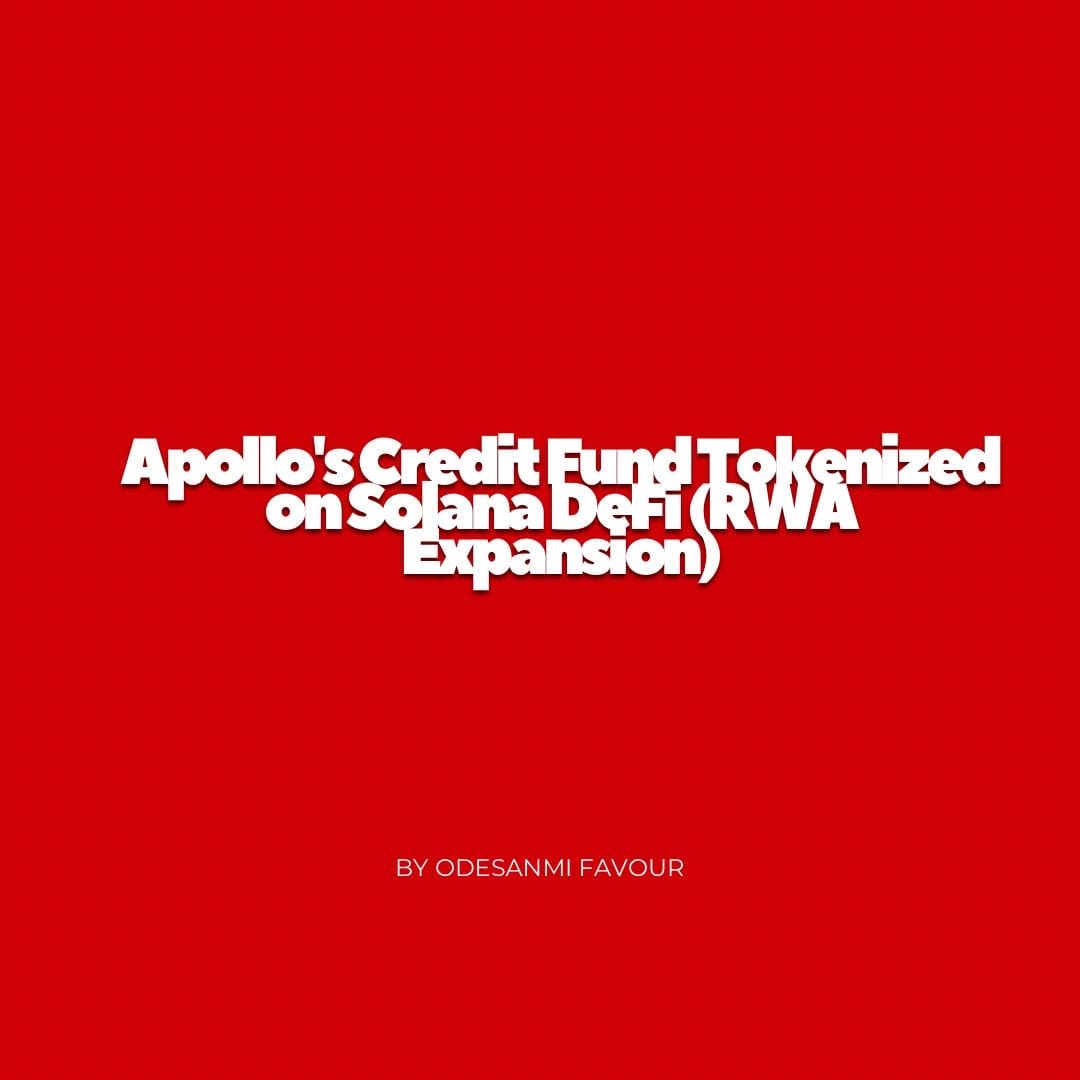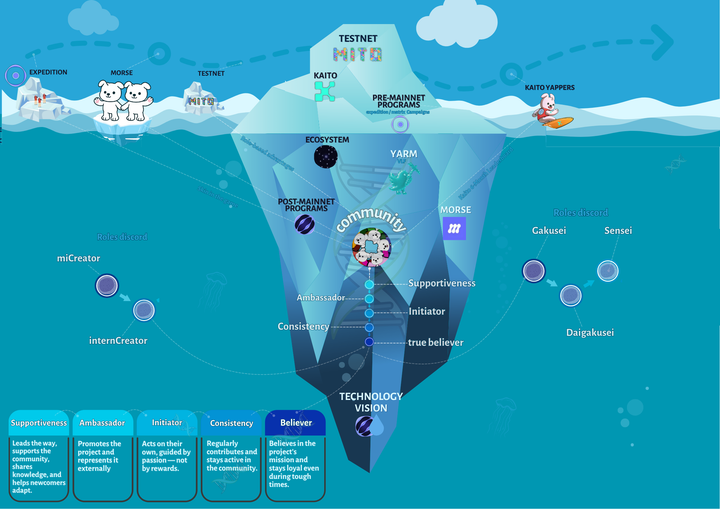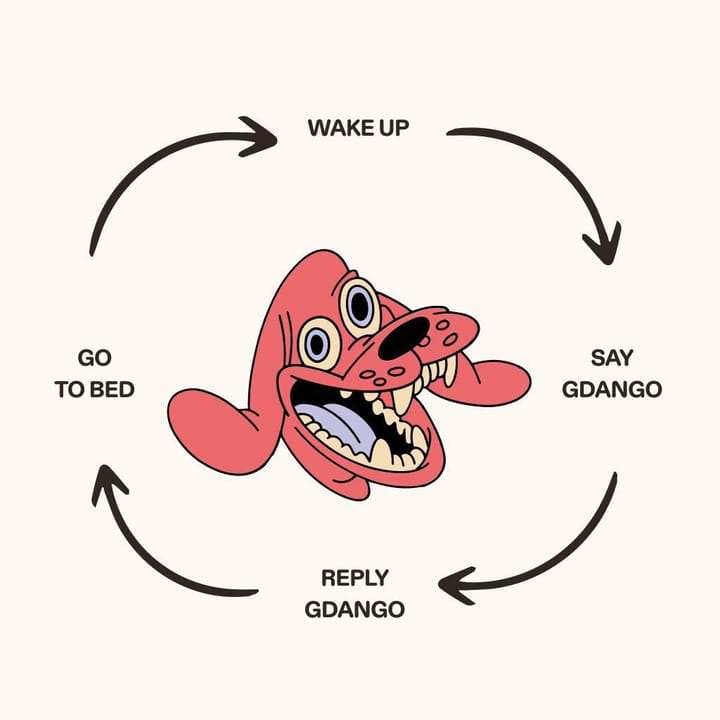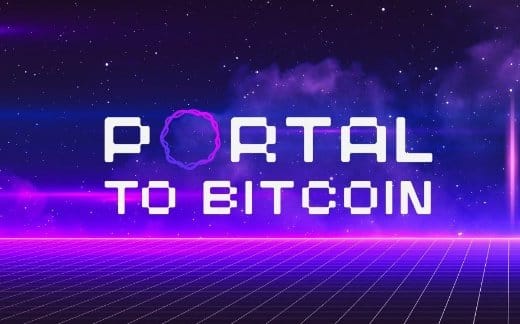Apollo's Tokenized Credit Fund on Solana DeFi: A Leap Forward in Real-World Asset Expansion

Introduction
The financial world is witnessing a seismic shift as traditional finance (TradFi) converges with decentralized finance (DeFi). A landmark development in this evolution is Apollo Global Management’s launch of its tokenized credit fund, ACRED, on the Solana blockchain. With $785 billion in assets under management (AUM), Apollo’s move to bring a $1.3 billion private credit fund into Solana’s DeFi ecosystem marks a pivotal moment for real-world asset (RWA) tokenization. This initiative, facilitated by partnerships with Securitize, Kamino Finance, and Steakhouse Financial, underscores the growing appetite for integrating traditional financial instruments with blockchain technology. By tokenizing ACRED, Apollo is not only bridging the gap between TradFi and DeFi but also setting a precedent for institutional adoption of blockchain-based finance.
In this article, we would explore:
1. What RWA Tokenization Means and Why It Matters
2. Apollo’s ACRED Fund: A Deep Dive into Its Structure and Solana Integration**
3. The Broader Implications for DeFi and Institutional Finance
What RWA Tokenization Means and Why It Matters
Real-world asset (RWA) tokenization involves converting traditional assets—such as private credit funds, bonds, real estate, or commodities—into digital tokens on a blockchain. These tokens represent ownership or exposure to the underlying asset, enabling fractional ownership, enhanced liquidity, and programmable use in DeFi protocols. Tokenization reduces friction in investing by streamlining processes like settlement and custody, while blockchain’s transparency ensures immutable records of transactions and ownership.
Why It Matters
- Accessibility: Tokenization lowers barriers to entry, allowing a broader range of investors to access asset classes traditionally reserved for institutions or high-net-worth individuals. For example, a retail investor could purchase a fraction of a tokenized private credit fund like ACRED, which would be inaccessible in its traditional form due to high minimum investment thresholds.
- Liquidity: Illiquid assets, such as private credit, become tradable on secondary markets. This is a game-changer for assets that typically lock up capital for years. For instance, tokenized U.S. Treasuries have already attracted over $6 billion in market value, demonstrating the demand for liquid RWAs.
- DeFi Integration: Tokenized assets can be used as collateral for borrowing, yield farming, or automated investment strategies in DeFi. This “composability” allows investors to stack financial products in innovative ways, creating opportunities not possible in traditional finance. An example is Kamino Finance’s “looping” strategy, where ACRED tokens are used as collateral to borrow stablecoins, which are then reinvested to amplify yields.
Challenges
Despite its potential, RWA tokenization faces hurdles. Regulatory compliance across jurisdictions remains complex, as tokenized assets must adhere to securities laws. Additionally, the liquidity of tokenized private credit is still nascent, with ACRED’s reported $0.00 24-hour trading volume highlighting the need for deeper secondary markets. Smart contract risks and the inherent illiquidity of underlying assets also pose challenges.
Apollo’s ACRED Fund: A Deep Dive into Its Structure and Solana Integration
Apollo Global Management, a $785 billion asset manager, launched the Apollo Diversified Credit Securitize Fund (ACRED) in January 2025, initially across six blockchains: Solana, Ethereum, Aptos, Avalanche, Polygon, and Ink. The fund, tokenized by Securitize, offers exposure to Apollo’s private credit strategies, including corporate direct lending, asset-backed finance, and structured credit. ACRED’s integration into Solana’s DeFi ecosystem, announced in May 2025, marks Solana’s first RWA offering and a significant step toward institutional-grade DeFi.
Structure of ACRED
- Asset Composition: ACRED is a feeder fund investing in Apollo’s $1.3 billion Diversified Credit Fund, which focuses on five pillars: corporate direct lending, asset-backed lending, performing credit, dislocated credit, and structured credit. This diversified approach aims for low volatility and high yields, with ACRED delivering an 11.7% return in 2024, outperforming U.S. Treasuries’ 4.5% yield.
- Regulatory Framework: Issued as a regulated sToken by Securitize, ACRED ensures compliance with securities laws. Access is restricted to accredited or verified investors through Securitize Markets, with Securitize acting as the digital transfer agent and fund administrator.
- Cross-Chain Interoperability: ACRED leverages Wormhole’s cross-chain messaging protocol to enable seamless movement across multiple blockchains, enhancing liquidity and accessibility. This allows investors to trade or collateralize ACRED tokens on Solana’s DeFi protocols or other networks like Ethereum.
Solana Integration
Solana’s selection as a primary DeFi hub for ACRED is strategic. Known for its high throughput (400ms block times), low transaction costs ($0.0001 on average), and scalability, Solana is ideal for high-frequency financial operations. Recent network upgrades, including zero-knowledge proof integration for privacy features, further align Solana with institutional demands.
- Kamino Finance: Through its Multiply product, Kamino enables investors to leverage ACRED tokens for yield strategies.
For example, users can deposit ACRED as collateral, borrow stablecoins, and reinvest in ACRED to amplify exposure, with smart contracts managing collateral and borrow levels. This “looping” strategy can generate yields up to 16%, as seen on platforms like Morpho Labs.
- Drift Protocol: Drift Institutional offers a white-glove service to assist large institutions in integrating RWAs like ACRED into Solana’s DeFi ecosystem, ensuring seamless onboarding and risk management.
- Steakhouse Financial: As a DeFi risk advisor, Steakhouse ensures ACRED’s integration maintains financial stability and adheres to best practices, mitigating smart contract and market risks.
Example in Action
Imagine an accredited investor using Kamino’s Multiply product. They deposit $10,000 worth of ACRED tokens, borrow $5,000 in USDC, and reinvest in ACRED. This process repeats, amplifying their exposure to Apollo’s private credit strategies. If ACRED yields 11.7% annually, the leveraged strategy could push returns closer to 16%, though with increased risk. This composability showcases DeFi’s ability to enhance traditional finance products.
The Broader Implications for DeFi and Institutional Finance
Apollo’s tokenized credit fund on Solana is more than a novel financial product; it’s a catalyst for transforming the financial landscape. The initiative signals institutional confidence in blockchain infrastructure and highlights Solana’s growing role as a DeFi hub. Here are the broader implications:
Institutional Adoption of DeFi
Apollo’s entry into Solana DeFi follows a trend of traditional finance giants embracing blockchain. BlackRock’s BUIDL fund on Avalanche, Franklin Templeton’s tokenized money market fund, and HSBC’s experiments with blockchain-based settlement demonstrate a growing appetite for RWAs. Apollo’s ACRED, with its $1.3 billion valuation, adds significant weight to this movement, potentially attracting $5–10 billion in RWA inflows to blockchain networks by 2026.
Solana’s Rise as a DeFi Powerhouse
Despite hosting only $330 million in RWAs compared to Ethereum’s $7 billion, Solana’s DeFi market has grown to nearly $9 billion, with total value locked (TVL) increasing 89% year-to-date in 2025. ACRED’s launch could be a tipping point, positioning Solana as a primary destination for tokenized assets. Solana now accounts for over 60% of RWA-related DeFi activity, despite its later entry into the space.
Democratizing Private Markets
By tokenizing ACRED, Apollo is making private credit—a $2.1 trillion market—more accessible. While currently limited to accredited investors, the infrastructure being built could eventually allow retail investors to participate in tokenized RWAs, pending regulatory evolution. This democratization could reshape wealth distribution and investment opportunities.
Challenges and Future Outlook
The success of ACRED hinges on addressing liquidity constraints, regulatory clarity, and smart contract security. Secondary market depth for ACRED tokens must develop to realize tokenization’s liquidity promise. Additionally, regulators must keep pace with DeFi’s composability-driven complexity. Looking ahead, projects like Remora Markets and further Solana upgrades could drive broader adoption of tokenized assets.
Example of Broader Impact
Consider a pension fund seeking diversified, high-yield investments. By allocating a portion of its portfolio to ACRED on Solana, the fund gains exposure to private credit with daily NAV redemptions, a feature unavailable in traditional private credit markets. This flexibility, combined with DeFi’s yield-enhancing strategies, could attract more institutional capital to blockchain ecosystems, stabilizing and maturing DeFi markets.
Conclusion
Apollo’s tokenized credit fund, ACRED, on Solana’s DeFi ecosystem is a watershed moment for RWA tokenization. By bridging traditional private credit with blockchain technology, Apollo is unlocking new opportunities for investors while signaling institutional confidence in DeFi. The integration of ACRED into Solana, facilitated by Kamino Finance, Securitize, and Steakhouse Financial, showcases the power of composability and interoperability in modern finance. As challenges like liquidity and regulation are addressed, initiatives like ACRED could redefine how financial assets are accessed, traded, and managed, paving the way for a more inclusive and efficient financial system.



Comments ()